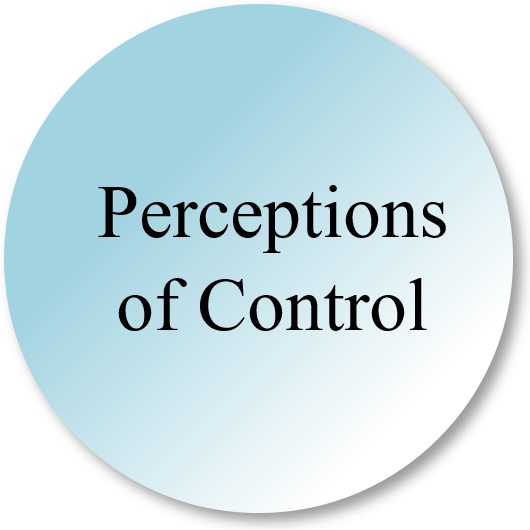




Perceptions of Control
Many of our LAHR studies examine the psychological sense of control, a cornerstone of successful aging. Perceived control becomes critical in later life when people face losses in physical function, sometimes from traumatic health crises such as a hip fracture or from chronic health problems such as arthritis. LAHR research draws on several theoretical perspectives (Two Process Model of Perceived Control; Life Span Theory of Development; Attribution Theory) to examine how control beliefs and strategies relate to older people�s health, life satisfaction, emotions, use of health services, and survival.
Our research findings, for example, show that the psychological state in which one feels out of control predicts poorer physical and functional well-being, increased health services use, and even mortality (Chipperfield, 1993; Chipperfield, Campbell, & Perry, 2004; Chipperfield & Greenslade, 1999; Chipperfield, Newall, Perry, Bailis, Stewart, & Ruthig, 2012). Believing one�s health problem are due to the uncontrollable cause of old age also predicts mortality as we show in our article that won the Canadian Institutes of Health Research Age + Award (Stewart, Chipperfield, Perry, and Weiner, 2012).
Selected Publications
Swiff, A. U. & Chipperfield, J. G. (2013). Secondary Control Belief Combinations and Well-Being in Older Adults: The Benefits of Adjustment and Acceptance, Canadian Journal on Aging, 32(4).
Chipperfield, J. G., Newall, N. E., Perry, R. P., Bailis, D. S., Stewart, T. L., & Ruthig, J. C. (2012). Sense of control in late life: Implications for Health and Survival. Personality and Social Psychology Bulletin. 38(7), 1-12.
Chipperfield, J. G., Perry, R. P., & Stewart, T. L. (2012). Perceived control. In V. S. Ramachandran (Ed.), Encyclopedia of human behavior (2nd ed., pp. 42-28). San Diego, CA: Academic Press.
Stewart, T. L., Chipperfield, J. G., Perry, R. P., & Weiner, B. (2012). Attributing illness to �old age:� Consequences of a self-directed stereotype for health and mortality. Psychology and Health, 27(8), 881-897. Paper won the Canadian Institutes of Health Age Plus award given by the Institute of Aging.
Ruthig, J. C., Chipperfield, J. G., & Payne, B. (2011). A five-year study of older adults� health incongruence: consistency, functional changes, and subsequent survival. Psychology and Health, 26(11),1463-1478.
Ruthig, J. C., Hanson, B. L., Pedersen, H., Weber, A., Chipperfield, J. G. (2011). Later life health optimism, pessimism, and realism: Psychosocial contributors and health correlates. Psychology and Health, 26, 835-853.
Bailis, D. S., Segall, A., & Chipperfield, J. G. (2010). Age, relative autonomy, and change in health locus of control beliefs: A longitudinal study of members of a health promotion facility. Journal of Health Psychology, 15(3), 326-338.
Hall, N. C., Chipperfield, J. G., Heckhausen, J., & Perry, R. P. (2010). Control striving in older adults with serious health problems: A 9 year longitudinal study of survival, health, and well being. Psychology and Aging, 25(2), 423-445.
Haynes, T. L., Heckhausen, J., Chipperfield, J. G., Newall, N. E., & Perry, R. P. (2009). Primary and secondary control strategies: Implications for health and well being among older adults. Journal of Social and Clinical Psychology, 28, 165-196.
Newall, N. E., Chipperfield, J. G., Clifton, R. A., Perry, R. P., Swift, A., & Ruthig, J. C. (2009). Causal beliefs, social participation, and loneliness among older adults: A longitudinal study. Journal of Social and Personal Relationships, 26, 273-290.
Newall, N. E., Chipperfield, J. G., Daniels, L. M., Hladkyj, S., & Perry, R. P. (2009). Regret in late life: Exploring relationships between regret frequency, secondary interpretive control beliefs, and health in older individuals. International Journal of Aging and Human Development, 68 (4), 261 288. Paper won the Canadian Institutes of Health Age Plus award given by the Institute of Aging.
Ruthig, J. C., Chipperfield, J. G., Bailis, D. S., & Perry, R. P. (2008). Perceived control and risk characteristics as predictors of older adults' health risk estimates. Journal of Social Psychology, 148, 667-688.
Swift, A.U., Bailis, D. S., Chipperfield, J. G., Ruthig, J. C., & Newall, N. E. (2008). Gender differences in the adaptive influence of folk beliefs: A longitudinal study of life satisfaction in aging. Canadian Journal of Behavioural Science, 40(2), 104-112.
Chipperfield, J. G., Perry, R. P., Bailis, D. S., Ruthig, J. C. & Chuchmach, L . P. (2007). Gender differences in use of primary and secondary control strategies in older adults with major health problems. Psychology and Health, 22(1), 83-105.
Chipperfield, J. G., & Perry, R. P. (2006). Primary and secondary control strategies in later life: Predicting hospital outcomes in men and women. Health Psychology, 25, 226-236.
Chipperfield, J. G., Campbell, D. W., & Perry, R. P. (2004). Stability in perceived control: Implications for well being among older individuals. Journal of Aging and Health, 16, 116-147.
Chipperfield, J. G., & Greenslade, L. (1999). Perceived control as a buffer in the use of health care services. Journal of Gerontology: Psychological Sciences, 54(2), 146-154.
Chipperfield, J. G. (1993). Perceived barriers in coping with health problems: A 12-year longitudinal study of survival among elders. Journal of Aging and Health, 5, 123-139.
|

